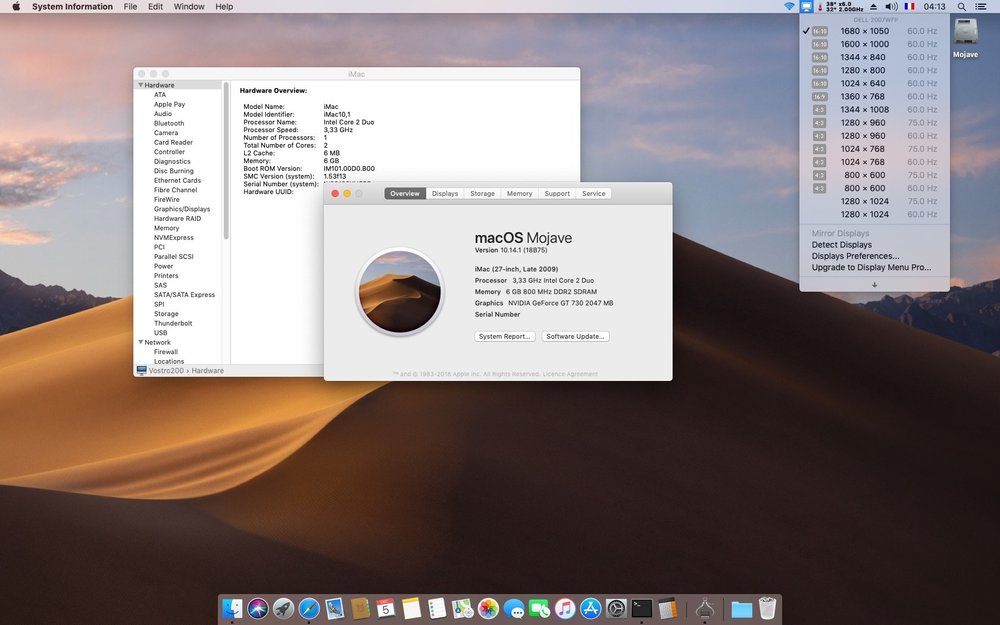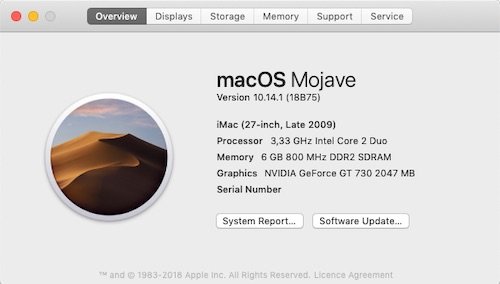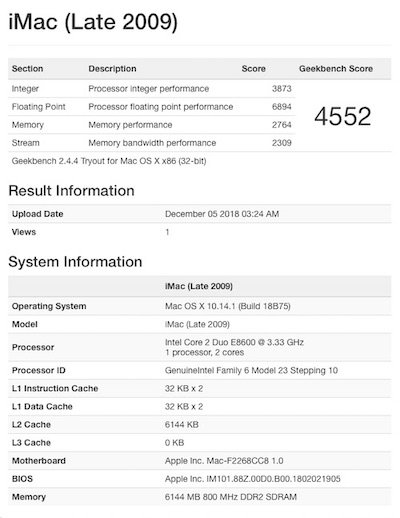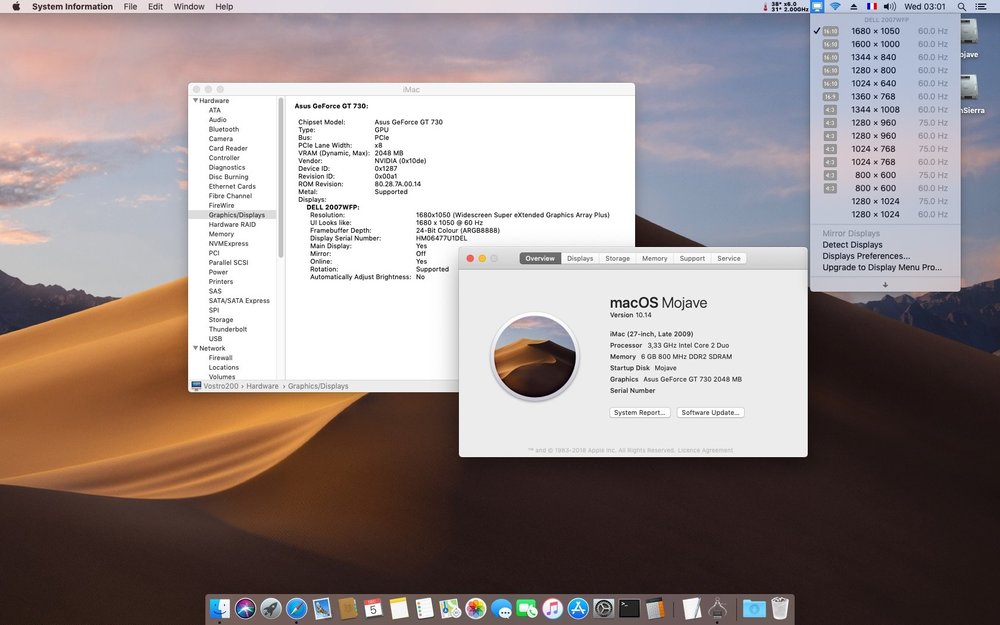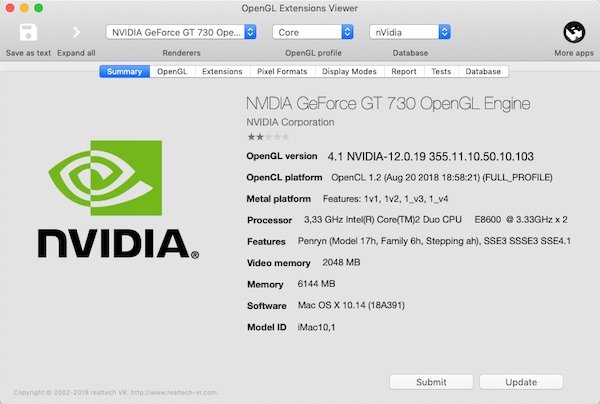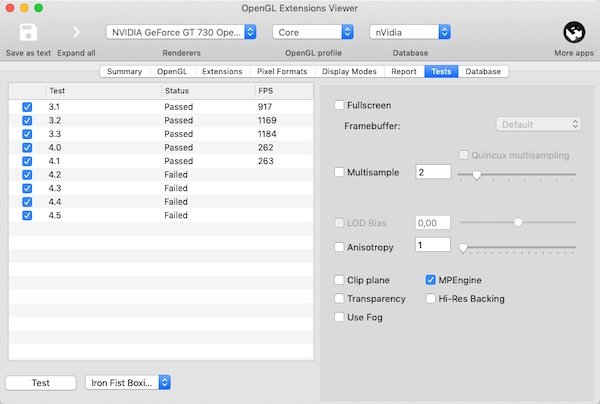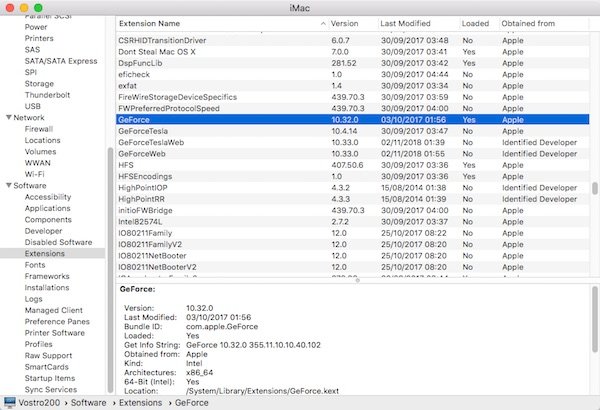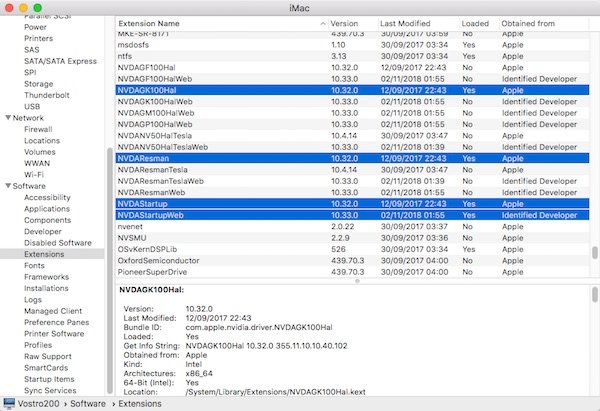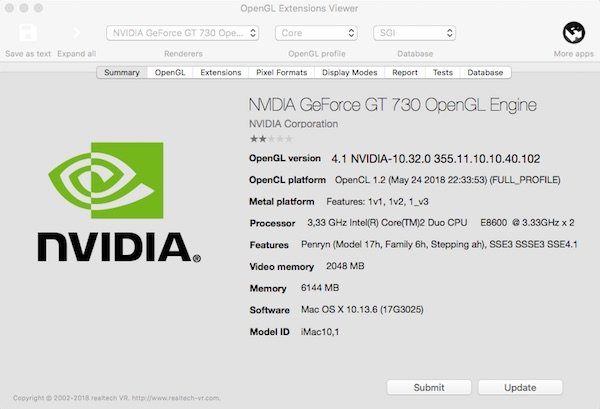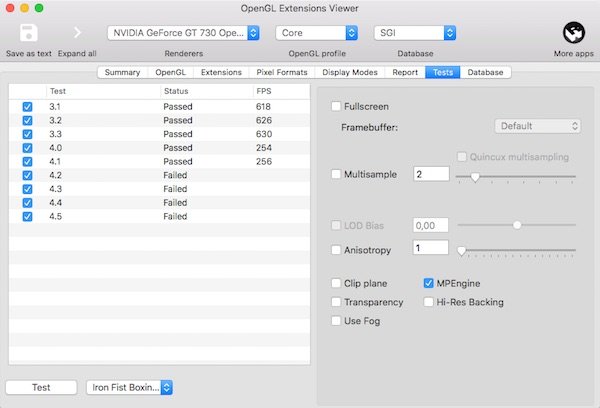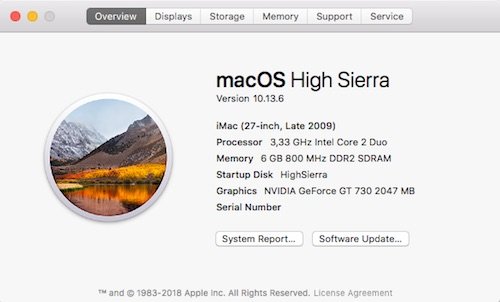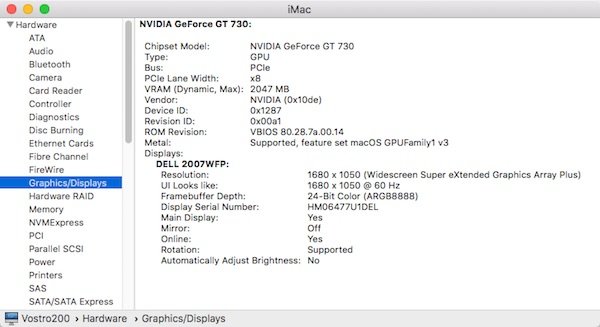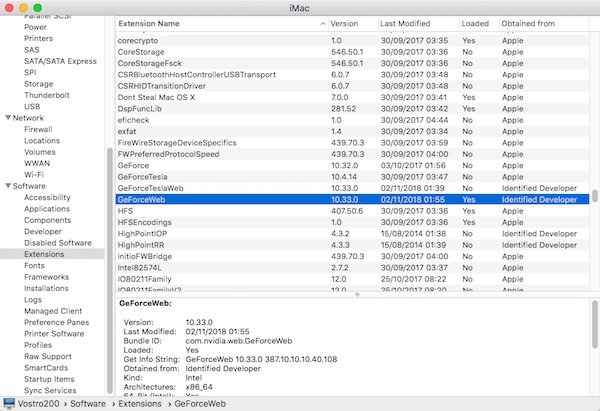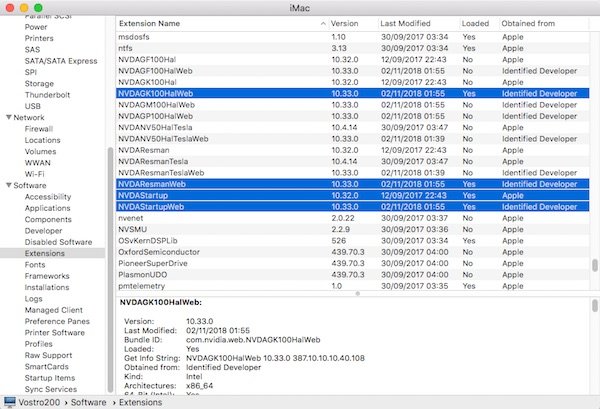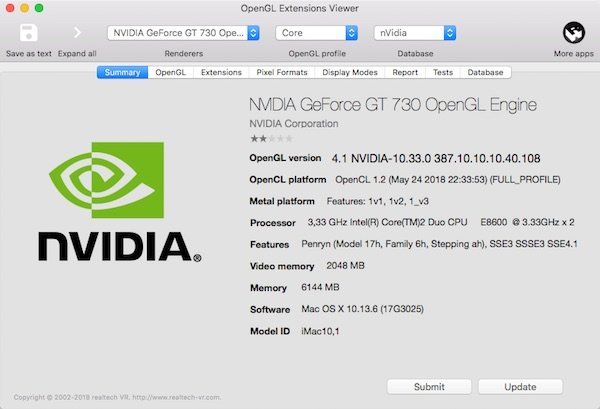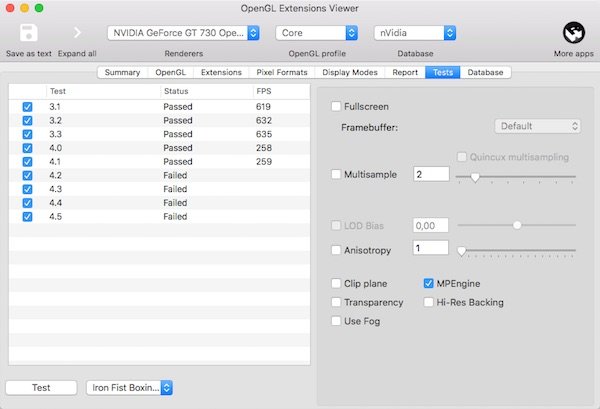-
Posts
10069 -
Joined
-
Last visited
-
Days Won
569
Content Type
Profiles
Articles, News and Tips
Forums
Everything posted by Hervé
-
ZTE MF210 is based on the following chipsets: MSM6290 -> Qualcomm 3G HSUPA (7,2Mbps D/L, 5,76Mbps U/L) RTR6285 -> Qualcomm RF IC PM6653 -> Qualcomm Power Management IC so, it's basically a Qualcomm device and, ideally, any CellPhoneHelper patch should be based on a Qualcomm profile.
-
All those mods are the same, regardless of the OS X/macOS version. Only the syntax of CellPhoneHelper entries may change according to OS X versions and may therefore need adjusting.
-
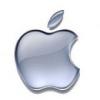
[HELP] Dell Optiplex 980 - OSX High Sierra installed but unstable
Hervé replied to jpb18's topic in The Archive
Why don't you post your Clover EFI folder (less Themes subfolder) so that we have a look at it? -
1. Yes 2. Make sure you've got CPU power management + GPU throttling properly setup/fully tuned. See here (if using Chameleon) and here. 3. Could be linked to incorrect CPU SpeedStep/power management 4. No support whatsoever for Intel cards. Consult our non-exhaustive inventory in R&D section for alternatives. 5. Please identify the make and model/PCI ids of your card reader 1st.
-
Arrived yesterday but not tested yet.
-
I've not found a need to use Lilu + WEG for graphics acceleration/GT730 support purposes. All in all, your issue could be related to the display device you use rather than your Mojave installation per sé. Maybe you could try and play with SwitchResX app to adjust settings like pixel rate or things like that. Or do some checking/injection of the EDID info.
-
Last update: 18 Aug 2019 Target macOS release: Mojave 10.14.x This is a Clover-based installation using the well-known/well documented vanilla method detailed below: Working: full graphics acceleration on GT730 OOB with macOS native driver multi-display (with Lilu +WEG): DVI & HDMI OOB, VGA with NVCAP value 050000000000FFFFFFFF00000000000E00000000 audio, including HDMI, microphone input and headset output (with AppleALC + all layouts or VoodooHDA) FastEthernet LAN connection (with 82566MM or AppleIntelE1000 kext, patched if necessary for PCI id 8086:10c0) 19-in-1 card reader OOB CD/DVD RW drive OOB front and rear USB ports (OOB) CPU power management (works better with MacPro3,1 SMBIOS than iMac10,1) sleep (Energy Saver settings, Apple menu, PWR button) & wake (PWR button, USB keyboard/mouse) Not working: N/A Not tested: N/A GeekBench v2.4.3 (32bit) gives a 4500+ rating: 1) 10.14 USB installer creation Using a USB key of 8GB minimum, create a Mojave USB installer through the following Terminal command: sudo <path>/Install\ macOS\ Mojave.app/Contents/Resources/createinstallmedia --volume /Volumes/<USB key> where: <path> = location of Mojave installation package (eg: /Applications if freshly downloaded) <USB key> = name of formatted USB volume (eg: USB_8GB) The process will take several minutes. Once completed: install Clover bootloader on the USB installer with the following customised settings: Install Clover in the ESP Boot Sectors -> Install boot0af in MBR Clover for BIOS (legacy) booting -> Clover EFI 64-bits SATA BIOS Drivers, 64 bit -> FSInject-64 / ApfsDriverLoader-64 / AppleImageLoader-64 BIOS Drivers, 64 bit -> GrubEXFAT-64 / GrubNTFS-64 (both optional only) Themes (optional only) Install Clover Pref Pane (optional only) you may use version r4689 r4911 attached below or any subsequent version available at Dids' Github repo: Clover_v2.4k_r4689.pkg.zip Clover_v2.4k_r4911.pkg.zip once Clover is installed, launch Clover Configurator app and mount the freshly created EFI partition of the USB installer Clover_Configurator.zip open this EFI partition and transfer the files & folders from the Vostro200 Mojave Clover pack below to the EFI/Clover folder Clover_pack_Vostro200_Mojave Clover_pack_Vostro200_Mojave_#2.zip copy High Sierra 10.13.6's telemetry plugin below to the root of your USB installer com.apple.telemetry.plugin.zip 2) 10.14 installation boot the Mojave USB installer at the Clover main menu, select the "Install macOS Mojave" partition (but don't press [ENTER]) press [SPACE], select -v verbose option in the menu, then choose to boot with the selected options proceed with installation, creating & formatting the target Mojave installation through Disk Utility as/if required on 1st reboot, boot off the USB installer and select the freshly created "macOS install from <target Mojave partition>" repeat this until this partition is no longer offered and only the target Mojave partition is left to boot at this stage, Mojave installation is complete but requires one final piece of tuning to avoid KP and boot loop reboot the USB installer as it if were the 1st time or reboot in single-user mode and, at main screen, open up Terminal from Tools menu copy 10.13.6's telemetry plugin to Mojave's target partition to avoid SSE4.2-related KP/reset on Core2Duo/Quad at boot time (this telemetry plugin process is required after each update ) cp -Rf /com.apple.telemetry.plugin /Volumes/<target Mojave partition>/System/Library/UserEventPlugins/ Exit Terminal and restart your computer. Reboot the target Mojave partition via your USB installer 3) Post-installation tuning Once the target Mojave partition has booted, complete the 1st boot configuration tuning Once at the desktop, install Clover bootloader on the Mojave partition/disk with the customised settings listed above Once Clover is installed, launch Clover Configurator app and mount the freshly created EFI partition of the Mojave partition/disk Open this EFI partition and transfer the files & folders from the above Vostro200 Mojave Clover pack to the EFI/Clover folder You may then reboot and verify that Mojave boots off your disk through Clover Edit #1: 19 Jan 2019 New pack with updated DSDT re-patched for proper Sleep & Wake Edit #2: 18 Aug 2019 Update Clover version to r4911 (minimum version) in order to recover RTC fix for Mojave 10.14.4 and later
-
Have now tried the card under Mojave and I still have no issues whatsoever. The card works OOB as expected and without any "glitches".
-
Switched to macOS default driver and the card works OOB as expected. No issues, everything runs perfectly, no glitch like yours. Please note that I'm running with latest Lilu kext v1.2.8 (not v1.2.7) and without WEG. I guess it could be an issue with Mojave itself. Will have to install it on a separate partition to compare. Is your GT730 running glitch-free under High Sierra? Have you tried it without Lilu & WEG?
-
Got the card today and have had it running for the last 2.5hrs. It's the Asus GT730-2GB-BRK low-profile model, based on GK208B Kepler GPU and running @PCIe x8 (despite x16 format). It's been running 100% trouble free for the last 3hrs (browsing, YouTube, DVP Player), I've not experienced that "glitch" of yours. I did a straight swap with the GeForce GT1030 so initially running with the nVidia Web driver v387.10.10.10.40.108.
-
Indeed, the GTX 1060 should just require the Web driver. That's all I've needed with the GT 1030 I've also recently acquired. It's working without any issues in my old Vostro200 and it's only fitted with a 250W power supply. Obviously High Sierra 10.13.6 is the end of the line with those Pascal cards at the moment since there are no web drivers for Mojave.
-
@tazmanian, please read our forum rules.
-
And stop using TMX tools to seek support here after.
-
It's coming too late but I've got a GT730 on order that should arrive by Monday. Will update this post with my own experience on the matter.
-
Nope, seems it's coming by foot from China...
-

First Install for Dell 5558, Mojave or High Sierra
Hervé replied to Mazen Elzanaty's topic in The Archive
Intel HD 6000? No, iGPU of Broadwell Intel i5-5200U CPU is Intel HD 5500: https://ark.intel.com/products/85212/Intel-Core-i5-5200U-Processor-3M-Cache-up-to-2-70-GHz- You need a boot configuration specific to your system, not just anything, i.e. a tuned-up Clover config + appropriate kexts (drivers) + eventual DSDT/SSDT patching. On paper, the nVidia 920M can be expected to be supported OOB since it's based on Kepler architecture. However, OS X/macOS do not support Optimus, so it can only be either the HD 5500 iGPU or the GeForce 920M dGPU, not both. You may have to get the dGPU disabled, either in BIOS or through DSDT/SSDT patching. There are many existing threads in this very section related to this Inspiron 5558 model, please consult them, especially the thread of Nov 10th! -

HS 10.13.6 upgrade to mojave assistance (e7450 with discreet nvidia)
Hervé replied to roniez's topic in The Archive
No, there would not really be any benefits to increase vram artifically but feel free to apply the patch if you deem it necessary. Personally, I've never seen or felt any difference with or without such increase. -
These really are very old cards (over 10yr old): AR5BXB83? Are you sure? Don't you mean AR5BXB63 like the AzureWave AW-GE780? That is like AR5BXB6 and unsupported since Lion 10.7. Broadcom BCM4311 -> Ok up to El Capitan 10.11 unsupported since Sierra 10.12 Realtek RTL8187B -> used to work 32bit mode in Snow Leopard 10.6 and Lion 10.7. Seems unsupported since. Don't hesitate to consult our inventories to find a more modern and more suitable card (802.11n/802.11ac); they're available in our R&D->Wireless & Bluetooth section.
-
NVS 5200M is Fermi 2.0 (GF118) and many nVidia GPU of that specific generation/architecture have issues in Sierra and/or High Sierra. Desktop GT610 is a typical example. Some of those Fermi cards sort of work but are subject to bugs, some don't and/or require the nVidia Web Driver for the relevant Sierra/High Sierra version. Web driver is usually required in cases of black screen at startup. https://www.insanelymac.com/forum/topic/324195-nvidia-web-driver-updates-for-macos-high-sierra-update-11032018/
-

[SOLVED] MOJAVE + E6530 HD4000 Only? [Any fully working EFI Bootpack?]
Hervé replied to pablx307's topic in The Archive
Use Pike R Alpha well-known tool: https://github.com/Piker-Alpha/ssdtPRGen.sh -

DW5630 (EVDO-HSPA) Mobile Broadband Mini-Card
Hervé replied to Gustave's topic in Modems/WWAN modules
Thanks but that link is pretty useless for those people who do not speak German. And that's highly likely to be the majority of our forum users. If you wish to share what you did to reach success, we'd all appreciate it. Posting a simple screenshot in Russian? language that says "look I've done it" is not of any value to anybody. -

[SOLVED] MOJAVE + E6530 HD4000 Only? [Any fully working EFI Bootpack?]
Hervé replied to pablx307's topic in The Archive
Your immediate hibernation/sleep issue is quite typical when you do not have the correct CPU power management settings in place. If you use a generated SSDT, make sure it's one made for your particular CPU, not a different model. -

[SOLVED] MOJAVE + E6530 HD4000 Only? [Any fully working EFI Bootpack?]
Hervé replied to pablx307's topic in The Archive
Having moved the HDD from a SandyBridge/HD3000 E6420 to an IvyBridge/HD4000 E6530, you'd need to adjust your Clover config and set up the following: Graphics section: Inject Intel layout-id 0x01660003 SMBIOS section: MacBookPro9,2 -
Last updated: 14 Jun 2025 We occasionally get questions about compatible graphics cards, so these articles should be useful for Hackintoshing purposes: 1) Best budget (under $50) graphics cards in 2025 Some of those cards are compatible with macOS up to High Sierra. Only a handful support Metal and Mojave/Catalina/Big Sur, i.e. Kepler architecture for nVidia (e.g.: GeForce GT 710) and GCN1.0 architecture for AMD (e.g.: AMD R5 240). And remember that, since Monterey, macOS dropped all support for nVida cards. 2) Best low-profile single-slot graphics cards for Small Form Factor (SFF) PCs in 2025 All those cards are compatible with late versions of OS X/recent versions of macOS. Afaik, all meet the minimum requirements for Metal but caution with nVidia cards since Mojave/Catalina/Big Sur only support Kepler models and, since Monterey, macOS dropped all support for nVida cards. 3) Best 1080p gaming graphics cards under $150 Those are good and reasonably priced cards, compatible with late versions of OS X/recent versions of macOS. Some do not need dedicated power supplies and will draw power from the PCIe bus. Afaik, all meet the minimum requirements for Metal but, again, caution with nVidia cards in Mojave/Catalina/Big Sur since those only support Kepler models and, since Monterey, macOS dropped all support for nVida cards. The site offers other "best graphics cards..." articles like "under $100", "under $200", etc. All available through a basic search.
- 1 reply
-
- 2
-



